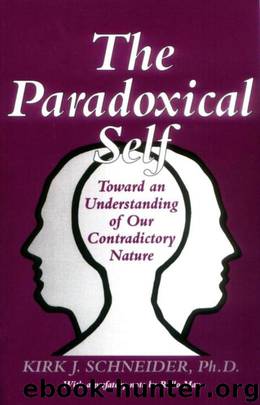The Paradoxical Self: Toward an Understanding of Our Contradictory Nature by Kirk J. Schneider

Author:Kirk J. Schneider [Schneider, Kirk J.]
Language: eng
Format: epub
Publisher: amazon
Published: 2020-05-07T16:00:00+00:00
Chapter Five OPTIMAL CONFRONTATIONS WITH PARADOX
In creative activity, genius is at the ultimate limit of tension, the utmost reach, of intensity, penetration. . . . But no wonder it overtakes the physical and mental powers, and unbalances the high-strung genius.
-Radoslav Tsanoff
We have now examined two responses to infinitude: the dysfunctional and the conventional. Dysfunctional people tend to directly and conventional people indi-rectly evade constrictive or expansive terror. Dysfunc-tional people tend to find personal means to escape their dread, such as schizophrenia, depression, and a rich world of symbols. Conventional people tend to find less personal means to escape, such as drugs, prejudices, religions, and a wide asssortment of signs.
Yet what would it be like if people had a different response to infinitude? What would it be like if people were motivated by more than just terror, but by liberal doses of interest, attraction, and fascination? What if people dared to grapple with their polarities and main-tained some sense of control over them? What would these people be like individually? What would they be like collectively? Despite our sparse knowledge in these areas, a profile of such people does appear to be emerg-ing (see, for example, Becker, 1973; Bellah et al., 1985; Garfield, 1986; Gilligan, 1982; Kobasa, 1979; Linville, 1987; Maslow, 1968; May, 1969; Schachtel, 1959).
In particular, it appears that such people are "healthier," or what existentialists call more integrated, creative, or hardy, than ordinary people. This does not mean that life is geometrically balanced for them or that they practice "moderation in all things," as the Greeks admonished. Far from it. It means, however, that opti-mal people-especially within the limited sphere of their interests-dare to challenge and confront their constrictive and expansive capacities. They find the "right" (that is, most useful)' blend of constriction and expansion to meet relevant demands (see Rothenberg, 1979).
As a result, optimal people show relatively fewer debilitating symptoms and conflicts, especially in their areas of expertise (Maslow, 1968; Linville, 1987). They have a greater sense of personal and collective purpose (see Bellah et al., 1985; Garfield, 1986; Kobasa, 1979). They tend to work harder and love more intensely (Gar-field, 1986; Fromm, 1956). They enjoy the escalation of tension, excitement, and suspense as much or more than they do the fulfillment or outcome of such disposi-tions (Klein, 1976; May, 1977; Schachtel, 1959). They tend to be challenged rather than terrified by constric-tive and expansive extremes, and as a result, construc-tively reframe those extremes (Barron, 1963; Garfield, 1986; Kierkegaard, 1954). At the same time, they sense when to retreat and "gather their forces" (Kobasa, 1979). In short, optimal people have well-developed centers-they are more able to choose their retractions and expansions, whereas dysfunctional and conven-tional people are greatly diminished in this capacity.
Download
This site does not store any files on its server. We only index and link to content provided by other sites. Please contact the content providers to delete copyright contents if any and email us, we'll remove relevant links or contents immediately.
Rewire Your Anxious Brain by Catherine M. Pittman(18630)
Talking to Strangers by Malcolm Gladwell(13338)
The Art of Thinking Clearly by Rolf Dobelli(10406)
Mindhunter: Inside the FBI's Elite Serial Crime Unit by John E. Douglas & Mark Olshaker(9308)
Becoming Supernatural by Dr. Joe Dispenza(8194)
Change Your Questions, Change Your Life by Marilee Adams(7730)
Nudge - Improving Decisions about Health, Wealth, and Happiness by Thaler Sunstein(7687)
The Road Less Traveled by M. Scott Peck(7581)
The Lost Art of Listening by Michael P. Nichols(7485)
Mastermind: How to Think Like Sherlock Holmes by Maria Konnikova(7312)
Enlightenment Now: The Case for Reason, Science, Humanism, and Progress by Steven Pinker(7303)
Win Bigly by Scott Adams(7181)
The Way of Zen by Alan W. Watts(6589)
Daring Greatly by Brene Brown(6500)
Big Magic: Creative Living Beyond Fear by Elizabeth Gilbert(5739)
Grit by Angela Duckworth(5591)
Ego Is the Enemy by Ryan Holiday(5406)
Men In Love by Nancy Friday(5225)
The Laws of Human Nature by Robert Greene(5153)
